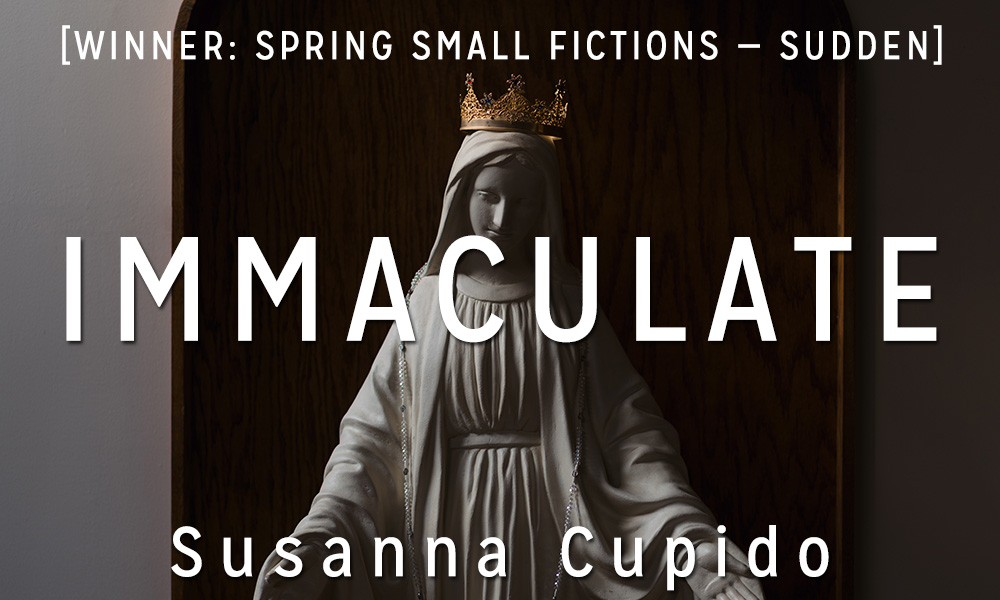“Immaculate” is the kind of story that will crawl inside your body and live there for a long, long time. I read it again and again with breathless fervor, totally devoted to its beautifully rendered characters. It’s a striking exploration and excavation of queerness, shame, desire, intimacy, the im/possibilities of merging/touching, and the lessons we inherit and live inside. Every single sentence thrums with irrepressible, electrifying energy, populating the multi-faceted landscape of this story with brilliant characterization, interior worlds, sensation, precarity, and aching internal conflict. The ending, too, is endlessly thought-provoking. This story is a revelation, an unforgettable full-body experience. — Guest Judge K-Ming Chang

The first thing I ever noticed about Catherine’s bedroom was the framed print of the Virgin Mary hanging on the wall above the bed. It was a different kind of Mary than the ones who decorated the classrooms of Our Lady of Mercy—she wasn’t praying, but staring straight ahead, her dark eyes fixed on a point in the distance. The second thing I noticed was the wall itself, and the nine diamond-shaped panes of glass that were set into it. Thick and mottled green, warped like the bottom of a wine bottle, and all nine panes arranged into a single larger diamond. The glass went all the way through the bedroom wall—looking through it, I could just make out the smudgy shape of the living room table, the radiator, the cabinet where her mother kept the blue-patterned porcelain. Everything in fog, distorted and stretched by the bubbles that had been blown into the glass.
“It was there when we moved in,” said Catherine, and made a face. “Not the picture, I mean. The window.”
I tapped a pane with my fingernail, a flat little plunk like the highest key of a piano. “It’s really nice.”
It wasn’t. It was awful, and the picture was, too. There was nowhere in the bedroom that you could stand without feeling watched. If I’d been a little older, I would have thought: It’s a panopticon. Thirteen, still three months shy of fourteen, I only thought: Creepy.
But Catherine was used to it. She pulled her uniform sweater up over her head and off, let it fall in a crumpled heap on the floor. The fabric of her button-down blouse was ironed into crisp planes, making her chest and stomach look oddly angular. The crest of Our Lady of Mercy on the left side, over her heart. “Do you want anything to drink? There’s some juice in the fridge.”
“I’m okay,” I said, even though my mouth felt dry and thick, my tongue starting to swell. I sat on the edge of her bed and the mattress creaked and bowed, rising up around me like I was a parasite burrowing in.
“It’s strawberry and rhubarb, I think. Mum makes it fresh from the garden.”
“Honestly, I’m fine.”
She shrugged, then threw herself down beside me. The bedsprings screamed. I looked at our bare knees hanging off the mattress, very close together, and how the tartan pattern of my skirt seemed to blend continuously into the pattern of hers. If I put my fingertip on the red stitch that started just over my thigh, I thought I could trace it all the way into her lap. I folded my arms tightly, trapping my hands against my ribs.
“It’s normal to be nervous, you know,” said Catherine. “Everybody gets a bit nervous, when they do it for the first time.”
“Did you?”
“Sure, I almost died. I thought God was going to reach down out of Heaven and stop my heart, just like that.”
She snapped her fingers, grinning at me, but I was only listening to the sounds that ran elsewhere in the house. The bathroom door opening, shutting, and then her mother’s footsteps crossing the living room. A shadow passing through the freckled glass. “It doesn’t take that long, does it?”
“Not really. Just a couple minutes, usually—longer if you want it to.”
I leaned back, sinking down on the bed until my shoulders were against the wall and my head was below the bottommost pane of the window, out of sight of anybody who might be looking through the glass. The mattress creaked again as Catherine followed me down. We were elbow-to-elbow, now, and the picture of the Virgin Mary hung above us. Looking up, I could only see the dark underside of her frame. A sliver of her blue robe, compressed. Once, in class, I’d asked Sister Frances whether Mary could only have been impregnated with our Holy Savior while she was ovulating, or if God could have done it to her any time. I’d been sent to stand in the cloakroom for a fifteen-minute detention; nobody seemed to know the answer.
“Ready?” said Catherine.
“I think so.”
Her voice dropped to a whisper. “Good. You can touch me, if you want to.”
“Really?”
“Not really. But you can just pretend.”
“Alright,” I said, soft, and ran my swollen tongue over my teeth, sucked at the inner flesh of my lips. “Alright, I’m touching you.”
I wasn’t. My hands were still resting on the bedsheets, palms-up and fingers slightly curled, pinned down by the pulse of blood through my wrists. The only point of connection between us were the pleated edges of our skirts overlapping, a stray few strands of dark hair tickling my collarbone. But Catherine was smiling.
I said: “I’m touching you. I’m touching your waist.”
“Good. I’m kissing you.”
“I’m kissing you, too. I’m kissing your neck and your chest. Your stomach.”
“I’m touching you—”
“I’m touching—”
“I’m—”
For a while, we just sat there together, throwing it back and forth between us, and the picture of the Virgin Mary hanging over our shoulders like a referee.
“Keep your legs pressed together,” Catherine told me. “You have to keep them together. Joanie says people’s hymens just break by accident sometimes, just from getting turned on, and their cherry pops and they just start bleeding, you know?”
“Oh.”
‘Turned on’ made it sound like something electric, something quick—a switch was flicked off-on in a darkened room—but it was only a thin and worming thread of pain between my legs. Like something was being drawn out of me, an inch at a time. I jammed my knees together so hard that I could feel the bones grinding, pushing myself up on my elbows so that my hips wouldn’t touch the coverlet. Blood stained badly and Catherine’s mother would see the marks when she did the laundry.
“Do you want me to have a climax?” asked Catherine, after a little while longer.
I nodded. “Please.”
“Alright,” she said, and smiled at me. Light shone through the glass planes above her head and tangled itself in her hair. “I’ve had one, now.”
“Oh.”
“I just had it.”
“Me too,” I said quickly. “I’ve just had one, too.”
After, I followed her out and sat at the kitchen table, while she poured her mother’s strawberry-rhubarb juice into two mason jars. The cloth was clean and white, frothing lace around the edges that tickled my bare knees, and a vase of wilting lilacs had been placed in the exact center of the table. A rancid smell clogged the air in the kitchen, sweet like tooth decay—I imagined the juice would taste the same. “Cheers,” said Catherine, and raised her jar.
“Cheers,” I said, but my hands were shaking; I tipped the jar too violently and a drop of red appeared on the tablecloth. “Shit—I’m sorry. Sorry.”
Catherine giggled. “It’s fine.”
But I lifted the vase of lilacs—I didn’t know what else to do—and put it down again, three inches off-centre, hiding the stain. It was gone and, when I smoothed down the lace, the creases were gone, too. The cloth was clean again.
 Susanna Cupido is a Canadian writer from Sackville, New Brunswick. She completed her undergraduate degree in English and Psychology at the University of King’s College in Halifax, Nova Scotia. Currently, she’s doing an MFA in Creative Writing at Cornell University. Her work has been published in Freefall Magazine and Accenti Magazine, and her first novel is due to be published in Spring 2024. She can be found at @scupido.bsky.social
Susanna Cupido is a Canadian writer from Sackville, New Brunswick. She completed her undergraduate degree in English and Psychology at the University of King’s College in Halifax, Nova Scotia. Currently, she’s doing an MFA in Creative Writing at Cornell University. Her work has been published in Freefall Magazine and Accenti Magazine, and her first novel is due to be published in Spring 2024. She can be found at @scupido.bsky.social
